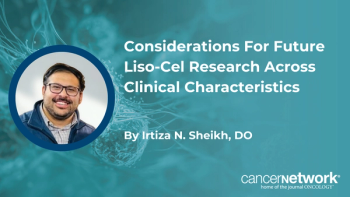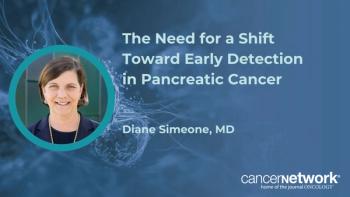
CLDN18.2-Directed CAR T-cell Therapy Effective, Safe in Gastrointestinal Cancers
A Claudin18.2–specific CAR T-cell therapy has shown promise in the treatment of patients with heavily pretreated advanced gastric and pancreatic adenocarcinoma whose disease expresses the marker.
Treatment with the Claudin18.2 (CLDN18.2)–specific CAR T-cell therapy CT041 elicited either a response or stable disease in a majority of heavily pretreated patients with CLDN18.2-positive advanced gastric and pancreatic adenocarcinoma, according to findings from a phase 1b US-based study (NCT04404595) presented at the
In the single-arm study, the objective response rate (ORR) with CT041 was 33% across efficacy evaluable patients enrolled in the study (n = 12), which included 1 complete response in a patient with metastatic gastric cancer. When including stable disease, disease control was observed in two-thirds of patients. There were no dose-limiting toxicities observed and no cases of grade 3 or greater cytokine release syndrome (CRS), immune effector cell–associated neurotoxicity syndrome (ICANS), gastrointestinal bleeding, or acute gastric mucosal injury.
“Even in patients who have been through 4 or more lines of chemotherapy, CLDN18.2 CAR-T cells produced dramatic and even complete responses,” said lead author Gregory P. Botta, MD, PhD, medical oncologist and associate professor of medicine at the Moores Cancer Center of UC San Diego Health. “Importantly, many responses were durable for months, allowing patients to improve performance status and quality of life. These early responses provide a signal to move into larger prospective trials of CT041 CAR T-cell therapy in solid tumors expressing CLDN18.2.”
Findings from the study, which was conducted in the United States, align with results from a phase 1b/2 study completed in China of CT041 in patients with gastric and gastroesophageal junction adenocarcinoma. Updated findings from this study were also presented at the 2022 ASCO Annual Meeting showing an ORR of 57.1% in 13 evaluable patients. This included all partial responses. When including stable disease, the DCR was 78.6%. The median progression-free survival was 5.6 months and the median overall survival was 10.8 months.2
CLDN18.2 is highly expressed in the gastric mucosa and intestinal epithelium and has been found to be highly expressed across a variety of cancers, especially those in the gastrointestinal tract. This high level of expression in malignant cells indicates it as an ideal candidate for targeted therapies.3 CT041 consists of an anti-CLDN18.2 scFv with a CD28 costimulatory domain and a CD3ζ signaling domain, which are linked with a CD8α hinge region and CD28 transmembrane region.
In the phase 1b study,1 14 patients were enrolled at 6 centers across the United States: 5 patients with gastric cancer and 9 with pancreatic adenocarcinoma. All patients were positive for CLDN18.2 expression. Patients had received a median of 3 prior lines of therapy (range, 1-5) before entering the study.
“Diffuse signet-ring gastric adenocarcinoma and pancreatic ductal adenocarcinoma have few effective options for treatment aside from traditional chemotherapy,” said Botta. “Unfortunately, chemotherapy responses and side effects restrict prolonged treatment.”
Once enrolled, patients underwent leukapheresis for cell therapy manufacturing. Prior to CT041 CAR T-cell infusion, a conditioning regimen of fludarabine, cyclophosphamide, and nab-paclitaxel (Abraxane) was administered. Three dose levels (DL) of CT041 were analyzed in the study. DL1 was 2.5 to 3.0 × 108 cells (n = 6), DL2 consisted of 3.75 to 4.0 × 108 cells (n = 6), and DL3 was 6.0 × 108 cells (n = 2). At the time of the assessment, efficacy data were available only for DL1 and DL2.
In the DL1 group, 1 of 6 patients experienced a response (16.7%) with 2 additional patients having stable disease, for a DCR of 50%. A higher response rate was seen in the DL2 group, with 2 of 6 patients having a response (33.3%) and 3 experiencing stable disease, for a DCR of 83.3%. Across all patients who experienced stable disease (n = 5), 80% had some level of tumor shrinkage that did not meet criteria for a partial response (30%).
In those with gastric cancer (n = 5), the ORR was 60% and there was 1 patient with stable disease (DCR, 80%). In those with pancreatic cancer (n = 7), there were no responses and 4 cases of stable disease (57.1%), all demonstrating some level of tumor shrinkage. The median duration of response and progression-free survival were not yet met.
Low-grade CRS was observed in 93% of patients following CT041 infusion, with 11 patients (79%) having a grade 1 event and 2 (14%) having a grade 2 event. The median time to onset of CRS was 2 days (range, 1-3) and only 2 patients required intervention with tocilizumab for grade 2 CRS. The median duration of CRS was 2 days (range, 1-8).
“Solid tumors, including gastric cancer, are of high incidence globally. As treatment options for gastric cancer are still limited, there is a strong need for more innovative therapies,” Raffaele Baffa, MD, PhD, chief medical officer of CARsgen Therapeutics Holdings Limited, the company developing CT041, said in a statement. “The updated clinical data of CT041 at ASCO 2022 are very encouraging in pre-treated GC/GEJ and GC patients, demonstrating significant efficacy and excellent tolerability, including the impressive ORR of 60% and a case of CR. We look forward to the continuing development of CT041 and we believe it can help more patients.”
The phase 1b study is continuing to enroll participants in the dose-escalation portion of the trial. Once a dose is identified, an expansion cohort will open to further evaluate the cell therapy at this dose level. Overall, the study anticipates enrolling 110 total participants and expects to complete in June 2025 (NCT04404595).
References
- Botta GP, Becerra CR, Jin Z, et al. Multicenter phase Ib trial in the U.S. of salvage CT041 CLDN18.2-specific chimeric antigen receptor T-cell therapy for patients with advanced gastric and pancreatic adenocarcinoma. J Clin Oncol. 2022;40(suppl 16):2538. DOI:10.1200/JCO.2022.40.16_suppl.2538
- Qi C, Liu C, Gong J, et al. Safety, tolerability, and preliminary efficacy results in patients with advanced gastric/gastroesophageal junction adenocarcinoma from a phase Ib/II study of CLDN18.2 CAR T-cell therapy (CT041). J Clin Oncol. 2022;40(suppl 16):4017. DOI: 10.1200/JCO.2022.40.16_suppl.4017
Newsletter
Stay up to date on recent advances in the multidisciplinary approach to cancer.





































